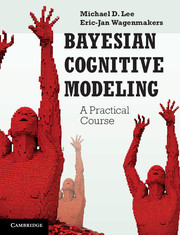Book contents
- Frontmatter
- Contents
- Dedication
- Preface
- Acknowledgements
- Part I Getting started
- Part II Parameter estimation
- Part III Model selection
- Part IV Case studies
- 10 Memory retention
- 11 Signal detection theory
- 12 Psychophysical functions
- 13 Extrasensory perception
- 14 Multinomial processing trees
- 15 The SIMPLE model of memory
- 16 The BART model of risk taking
- 17 The GCM model of categorization
- 18 Heuristic decision-making
- 19 Number concept development
- References
- Index
15 - The SIMPLE model of memory
Published online by Cambridge University Press: 05 June 2014
- Frontmatter
- Contents
- Dedication
- Preface
- Acknowledgements
- Part I Getting started
- Part II Parameter estimation
- Part III Model selection
- Part IV Case studies
- 10 Memory retention
- 11 Signal detection theory
- 12 Psychophysical functions
- 13 Extrasensory perception
- 14 Multinomial processing trees
- 15 The SIMPLE model of memory
- 16 The BART model of risk taking
- 17 The GCM model of categorization
- 18 Heuristic decision-making
- 19 Number concept development
- References
- Index
Summary
The SIMPLE model
Brown, Neath, and Chater (2007) proposed the SIMPLE (Scale-Invariant Memory, Perception, and LEarning) model, which, among various applications, has been applied to the basic memory phenomenon of free recall. In this application, the SIMPLE model assumes memories are encoded by the time they were presented, but that the representations are logarithmically compressed, so that more temporally distant memories are more similar. It also assumes that distinctiveness plays a central role in performance on memory tasks, and that interference rather than decay is responsible for forgetting. Perhaps most importantly, the SIMPLE model assumes that the same memory processes operate at all time scales, unlike theories and models that assume different mechanisms for short-term and long-term memory.
The first application considered by Brown et al. (2007) involves seminal immediate free recall data reported by Murdock (1962). The data give the proportion of words correctly recalled averaged across participants, for lists of 10, 15, and 20 words presented at a rate of 2 seconds per word, and lists of 20, 30, and 40 words presented at a rate of 1 second per word.
Brown et al. (2007) make some reasonable assumptions about undocumented aspects of the task (e.g., the mean time of recall from the end-of-list presentation), to set the time Ti between learning and retrieval of the ith item. With these times established, the application of the SIMPLE model to the free recall data involves five stages, which are clearly described in Brown et al. (2007, Appendix).
Information
- Type
- Chapter
- Information
- Bayesian Cognitive ModelingA Practical Course, pp. 196 - 205Publisher: Cambridge University PressPrint publication year: 2014
